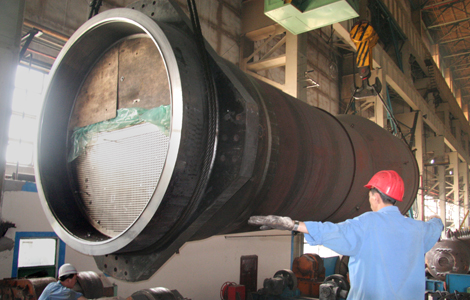Promote financial reforms
Updated: 2013-08-08 08:11
By China Forum (China Daily)
|
||||||||
Unbalanced macro structure has resulted in lack of flexibility and a high concentration of risks in the banking system
China urgently needs to launch a new round of financial reforms in response to the mounting systematic risks in the country's financial system.
Since the microprudential reform approach of the last round of reforms, with its emphasis on certain fields and financial institutions, is unfit for the new features and trends of the current financial system, the accumulation and evolution of systematic risks in recent years is crying out for a new round of financial reforms with a macroprudential perspective to soften the impact of the economy-wide fluctuations and economic restructuring.
China's financing system is overly reliant on bank credit. This unbalanced financial structure has resulted not only in a high concentration of risks in the banking system, but also in the financial system having less flexibility to resist external shocks. China's financial structure with its excessive dependence on indirect financing will not be able to meet and adapt to the various financing needs and changing risks during the process of economic restructuring, and it is not conducive to the transition of the economic growth pattern. The country's financial system is in need of restructuring in order to maintain stability.
Innovation is a prominent feature of the country's economic transition, which requires high investment and the aggregation of a large number of production factors and resources for support. A necessary condition for innovation and thus the success of the economic transition is having a sound financial structure and a healthy, mature financial market, especially a full-fledged capital market, in place. As an important platform for optimizing the allocation of resources, a cultivation mechanism for encouraging venture capital and screening mechanism to ensure the survival of the fittest, the capital market has an irreplaceable role to play in promoting innovation development and the economic transition.
There are two entry points for financial restructuring. First, with regard to "incremental" financing needs, China should forcefully develop multilevel capital markets - including bond and stock markets, exchanges and over-the-counter markets, increase the proportion of direct financing and improve its financial structure.
Therefore, further market-based and law-oriented reforms are needed to improve the effectiveness of market's role in allocating resources. In addition, during the process of economic transition, a large number of small and medium-sized enterprises are thirsty for more financing, which requires the development of multilevel capital markets.
Second, with regard to "stock" financial assets, mainly credit assets, the authorities should accelerate the pilot process of asset securitization, improve the relevant laws and regulations, and accelerate the restructuring of commercial banks so as to improve their ability to resist risks. Steadily promoting asset securitization will be conducive to not only the prevention and supervision of "shadow banking" risks, but also to accelerating the business restructuring and adjustment of commercial banks in order to improve their ability to serve the real economy.
The development of shadow banking in China is an outcome of not only the country's unbalanced financial structure and excessive financial regulations, but also financial innovation and market diversification. So we cannot totally repudiate the development of shadow banking in China just because of problems emerging in Western countries' shadow banking systems.
However, because of the congenital defect in the shadow banking system in risk prevention and the lack of supervision, the rapid development of shadow banking in China in recent years has resulted in mounting potential systematic risks. Compared with the excessive innovation and development of Western shadow banking, the problems in China's shadow banking system lie in institutional problems, such as excessive financial regulation and the lagging behind of financial and legal framework reforms.
Relevant laws and regulations should be established and improved to unify supervision rules, loosen financial regulation, normalize shadow banking activities and defuse potential risks. The relevant authorities should start financial legislation and modification, filling in the legal gaps.
China's reforms have lagged behind the development of its financial system, and the environment is not conducive to preventing and eliminating financial risks and maintaining the health and sustainable development of the financial system. From an international perspective, integrated financial management has become the mainstream for the development of international financial systems, and the rapid development of integrated financial management in China can only be achieved on the premise of reforms and remodeling of the financial regulatory system and legislative system.
This article is from a paper by the research group of the Financial Research Institute affiliated with the Development Research Center of the State Council. It first appeared in the China Economic Observer magazine.
(China Daily 08/08/2013 page8)
Most Viewed
Editor's Picks

|

|

|

|

|

|
Today's Top News
China to be leading business travel market
Cards make paying global tuition easier
Probes not targeting foreign brands
Sino-US trade gap narrows
Dairy firms hit with fines
A stage set for big innovation
Exports, spending 'to ebb'
Islands dispute hammers attitudes
US Weekly

|

|












